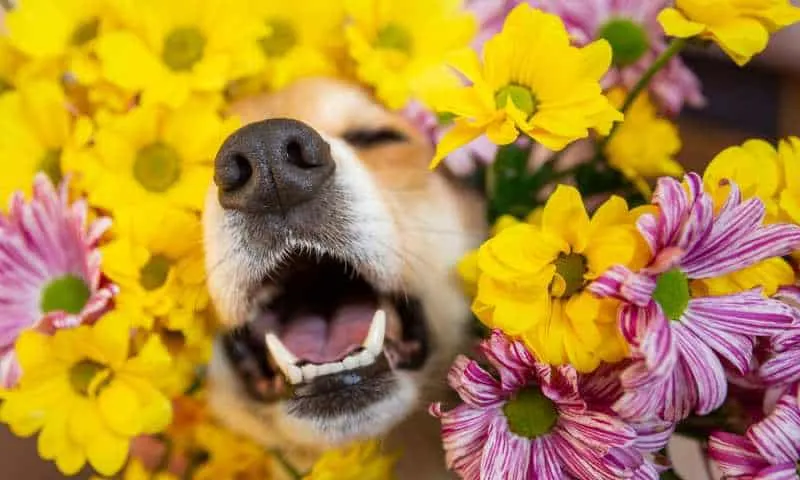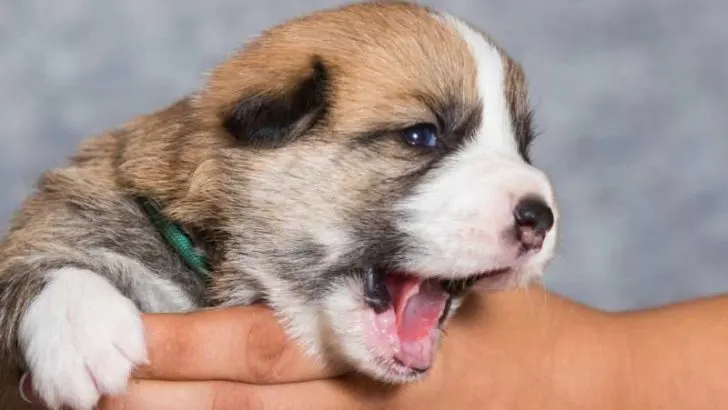Owning a dog has to be one of the most rewarding experiences in life, only comparable to parenthood? Seriously, just try remembering all the pleasant moments you had with your small Corgi.
But, all this joy doesn’t take away from the fact that raising a dog is also very challenging and sometimes downright stressful. For instance, what should you do if your puppy suddenly starts showing strange behavior like reverse sneezing?
Is this the same as sneezing? Is it dangerous? Should you take your pet to the vet? Why does my corgi sneeze so much?
Confusing, right? Well, to start solving this problem, you will first need to find an answer to one simple question – Why does my Corgi reverse sneeze / snort?
Well, to put your worries to rest, we will say that reverse sneezing is usually not dangerous and simply represents an allergic reaction to some outside substance. But, this issue shouldn’t be easily dismissed either.
Let’s go to the bottom of this together.

The Difference Between Sneezing And Reverse Sneezing
First, let us see what we are dealing with here. It’s tough to find a person who doesn’t know what sneezing is. However, reverse sneezing is a much rarer occurrence. To correctly identify what poor Corgis are dealing with, we will need to know to recognize the difference between the two.
1. “Normal” Sneezing
We put the word normal under quotation since there is not precisely such a thing as normal sneezing. Let’s take, for example, humans. Sneezing is a mechanism your body uses to clear the nose. It’s usually a reaction to the presence of some foreign material like smoke, dust, pollen, etc.
Because of them, the nostrils become irritated, and the body reacts by causing the sneeze. Essentially, sneezing can be seen as the body’s first defense mechanism against bacteria.
But irritation is not the only instance when we are sneezing, right? Yes, the same thing happens when we catch a cold. Still, even though the circumstances are entirely different, the mechanism behind sneezing is virtually the same – your body is trying to get rid of obstacles to breathing and unwanted substances. In this case, those would be the bodily fluids you have to deal with when you are sick.
Our puppies are really no different. If you see your Corgi sneezing around, it’s for the very same reasons as you would. The symptoms are the same, as well as the triggers.
How Much Sneezing Is Normal?
When all is said and done, we can say Corgis are sneezing either when they are irritated or if they have caught a cold. But, not every sneeze has to be an alert to allergy or sickness. It might just be that your puppy picked up some flying dandelion—no reason to drag the dogs to the vet for something mundane as that.
So, how much sneezing is considered tolerable? Is there such a thing as some sneezing threshold that marks the point when you should start being concerned?
Well, if you want to go entirely by the book, know that no sneeze should go unnoticed. Granted, the chances that something dangerous is going on will be much higher if you notice that your puppies are going through five or six consecutive sneezes in a row.
But, we have to remember that every allergy develops with a single sneeze, and there is no way to be 100% sure what’s going on with your puppies.
That is why you should take every sneeze as a warning and at least give your vet of choice a call to consult about the following steps. If the professional says you are clear – perfect. If the veterinarian schedules an examination, you might just save your Corgi from a lot of trouble in the following weeks.
Either way, it’s a win-win situation.
2. Reverse Sneezing
Now, let’s move to the issue we are not so familiar with – reverse sneezing. The reason why most of us don’t really know what this term describes is that we usually describe this occurrence as choking or even suffocating.
Here’s a short video that should give you an idea of what we are talking about.
You get the idea where the name comes from. Much like sneezing, reverse sneezing represents a sudden, powerful and erratic movement of air by your puppies’ bodies. In this case, though, the air is not all of a sudden breathed out but instead breathed in.
This phenomenon is known as paroxysmal respiration, and the abrupt movement of air is not the only thing it shares with sneezing. Namely, reverse sneezing happens when the puppies’ throat and the soft palate becomes irritated by some foreign substance. It represents Corgis’ attempt to remove those irritants by breathing the air in instead of out.
Not the most intuitive way to deal with the irritant substances, huh?
Well, you are right. Your pet’s natural reaction would be to deal with this problem by sneezing. If, on the other hand, irritation persists, the puppies will try to relieve irritation by reverse sneezing, usually in short episodes that consist of about six to seven sneezes.
One series usually lasts for a minute or two.
When Should You Start Feeling Concerned?
This is yet another instance where sneezing and reverse sneezing show a lot of similarities. If the puppies stop reverse sneezing after only one session, the chances are we are probably talking about a temporary irritation, and there’s nothing wrong with your pets.
But, let us remind ourselves that reverse sneezing is not your Corgis’ primary reaction to irritation. If they are only mildly annoyed, they will probably start sneezing. So, if you ever notice your puppies are reverse sneezing, let alone in numerous consecutive sessions, be sure to take them to the vet as soon as possible.

What About Reverse Snorting?
Yes, the question we ran with here was, why does my Corgi reverse sneeze / snort? Let us not forget about the second part of this important discussion.
Fortunately, reverse snorting is not nearly as unusual as reverse sneezing. As a matter of fact, you have probably seen some of your friends and relatives doing it, usually when they are laughing (or sleeping).
In the case of both dogs and human beings, snorting and reverse snorting are caused when the air we are breathing in or out doesn’t flow smoothly, nose or mouth. Instead, it bumps into surrounding tissue, reverberates, and produces loud (and admittedly unpleasant) noise.
Although very few people consider snoring and reverse snorting dangerous, they can, however, point out some bigger underlying issues. After all, if something’s preventing your puppies from breathing normally, you shouldn’t just shrug it off and dismiss it.

What Makes Your Corgis Reverse Sneeze Or Snort?
As we could see from the previous discussion, reverse sneezing and reverse snorting mostly occur due to different reasons. In the first case, the puppies are trying to relieve themselves from some temporary (or persistent) irritation from the throat, while in the second, they face a very slight problem in breathing.
Similar, but not quite the same.
However, it is essential to point out that, if they are not caused by some temporary irritation, both these behaviors may be pointing out to some ongoing, underlying problems, you should definitely take into consideration if you consider yourself a responsible owner.
Allergies And External Irritation
We have already briefly touched on this topic when we talked about reverse sneezing, but it’s worth reiterating that a number of different particles and external threats may cause your pet to try to quickly clear the throat. If these irritations persist or your puppies are allergic to some of the substances, they may cause swallowing, difficult breathing, and snorting.
Here are some of the most common culprits you should take into account:
- Dust
- Pollen and weeds
- Bugs, mites, and spiders
- Food particles
- Household chemicals
- Perfumes
- Hair
- Bacteria
- Grass particles (usually stuck in the nose)
Diseases
Of course, we are not talking about any disease but rather the ones that affect the puppies’ respiratory systems like viruses, cold, and kennel cough. However, although they are very common, these conditions shouldn’t be taken lightly, and you should take your puppies to the veterinarian clinic at the first sign of disease symptoms.
Human Behavior
By this, we primarily mean poor leash control. If you are pulling your Corgis too tight when you take them to walk, you may irritate their throats and thus cause swallowing, snorting, and sneezing.
Repeated sneezing and snorting also may point out that the dogs are overly excited and worked out without being properly hydrated (they are grabbing for air with sore throats). The same goes for spicy food.
But, sneezing and reverse sneezing may also be an attempt of your puppies to release some energy after you fed them or winded them up. If this happens only after these two instances and doesn’t blow out into minutes-long sneezing sessions, you have nothing to worry about.
Tracheal Collapse
Tracheal collapse is an irreversible, progressive, and chronic collapse of the trachea, lower airways, or windpipe that is mainly characterized by the incomplete formation or flattening of the trachea rings. Since this condition usually affects smaller breeds like Corgis, you should be very careful and act as soon as you notice the first symptoms.

In Conclusion
As we can see, reverse sneezing and snorting can be caused by several different reasons, most of which are entirely benign. In most cases, your Corgis will simply try to relieve some temporary and insignificant irritation.
But, these instances can also turn out to be symptoms pointing to some much more severe and ongoing health issues. So, don’t leave anything to chance, and be sure to consult your vet as soon as you notice something suspicious going on.
Learn More: Why Do Corgis Make Weird Noises?

